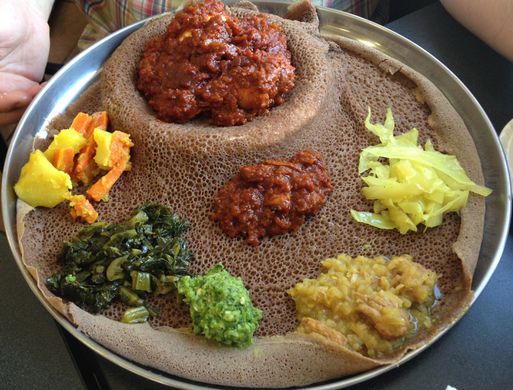 Canadians are noticing a dramatic rise in food prices. The price of rice has doubled in a few months, and products made of wheat are about fifty percent more expensive. I live on a very tight budget, so it affects me directly. Not as directly, of course, as the millions in unluckier countries who will experience food shortages.
Canadians are noticing a dramatic rise in food prices. The price of rice has doubled in a few months, and products made of wheat are about fifty percent more expensive. I live on a very tight budget, so it affects me directly. Not as directly, of course, as the millions in unluckier countries who will experience food shortages.
My particular survival strategy depends on circumventing global state-corporate agribusiness. Instead of serving my stews, chilis, and vegetables on rice, I am regularly buying njeera (or injera, enjira, etc.) at the local Ethiopian/Somali shops. There are several bakeries in Toronto that produce the delicious East African staple food, which, since it lies outside of the control of global agricultural collectivism, has not significantly risen in price. Not only does it taste delightful, but it is highly nutritious. And the dishes I put on the njeera? They are made, as much as I can manage, from seasonal local produce. Given a choice between paying money to an honest Canadian farmer and paying money to some loathsome global gangster who hires death squads to terrorize serfs, I know what choice is both moral and patriotic.
Njeera is made from teff, a grain only grown by traditional methods in Africa. Teff has excellent amino acid and lysine levels. One cup of cooked teff contains 387 milligrams of calcium (more, proportionately, than milk), and 15 milligrams of iron (twice as much iron as wheat and barley). Teff is high in protein as well as fiber. It is a rich source of metabolic copper, phosphorus, boron, and zinc. Shifting from pasta and rice to njeera, my grocery bill is no higher, and I’m enjoying my meals more. I’m sure that, inevitably, oil-driven increases in transportation costs will push up the price of njeera. So will scarcity, if many other people pursue the same strategy as I do. So is there some way for us to benefit more permanently from this excellent crop, which has escaped the global collectivization of agriculture?
While it originates in Africa, teff might easily grow in Canada. Optimum teff production occurs at altitudes of 1800 to 2100 m, in a growing season rainfall of 450 to 550 mm, and a temperature range of 10–27 °C. It thrives in both drought-stressed and moist soils. Since it is daylight-sensitive, growing best where there is 12 hours of daylight, the high-latitude, dry mountain valleys of Canada’s West might be ideal for the crop. Will it work? I don’t know, but it is one of many strategies we might explore if we are to reduce our vulnerability. Besides, East African teff is needed to feed East Africans. If we can generate our own supplies, then we will not be beholden to tyrants for it, and we can all the more honourably and efficiently support ourselves.
We must become food-independent. If we cannot produce enough food to feed ourselves, in this vast country, then we will always remain slaves to an international cartel of food pirates. Exporting huge quantities of wheat, beef, and pork, then paying premium prices to someone else to buy them back, is a sucker’s game. There’s no harm in importing bananas and oranges, which require a different climate to grow, but there’s no good reason why ninety percent of what we eat shouldn’t come from our own back yard, with no outsiders claiming a gouging cut of it for doing nothing. If we don’t control it, we shouldn’t depend on it. And if it necessary for our survival, we should be in charge. That’s the essence of independence, the cornerstone of freedom. Otherwise, we are just chumps, servants, helpless boobs. Don’t let Conservative double-talk obscure that plain truth.
International trade in agricultural goods is perfectly fine, when prosperous and productive local, self-sufficient farming in different places produces excesses that can be traded for mutual benefit. But that is not what is happening. What is happening is that millions of people are being forced — at gunpoint — off their own land, by wealthy, violent criminals, wielding the power of the State. Potentially self-sustaining production is being converted into collectivized agriculture. The impoverished, landless survivors of this collectivization are forced to buy imported food at exorbitant state-controlled prices, or starve. In other words, global corporate agribusiness is Communist agriculture all over again. This process has absolutely nothing to do with “free markets”, no matter what its slimy propagandists claim. It has nothing to do with democracy. This is a process that emerges, like the ideology of Chairman Mao, from the barrel of a gun.
0 Comments.